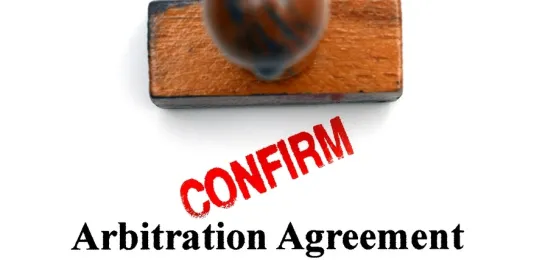In Greenstar IH Rep, LLC and Gary Segal v. Tutor Perini Corporation, Civil Action No. 12885-VCS (Del. Ch. Ct. February 23, 2017), the Delaware Court of Chancery granted in part and denied in part defendant’s motion for preliminary injunction, holding that the Court lacks subject matter jurisdiction to decide the question of substantive arbitrability when an employment agreement contains a broad arbitration provision that evidences the parties intent to arbitrate arbitrability.
The case involves a dispute between the parties following a 2011 merger in which defendant, Tutor Perini Corporation, acquired one of the plaintiffs, GreenStar Services Corporation (“GreenStar”). In connection therewith, the parties entered into both a Merger Agreement and an Employment Agreement, whereby plaintiff, Gary Segal, would serve as President and CEO of Five Star, a GreenStar affiliate, for an initial period of five years.
The issue presented in this case—as to who between the Court or an arbitrator selected by the parties should decide arbitrability—was further complicated because the Merger Agreement and Employment Agreement contained different choice of law, choice of forum, and dispute resolution provisions. The Merger Agreement contained a Delaware choice of law provision and a forum selection provision designating any state or federal court in Delaware as the exclusive forum; the Employment Agreement contained a New York choice of law provision and a mandatory arbitration provision.
Pursuant to the terms of the Employment Agreement, Tutor Perini initiated a J.A.M.S. arbitration in Los Angeles against Segal, alleging claims for breach of the Employment Agreement and other misconduct by Segal as an employee of Five Star. The Court classified those allegations as three defined types of claims— the “Earn-Out Claim,” the “Indemnification Claims,” and the “Consequential Damages Claim.” The plaintiffs filed the instant Complaint in the Delaware court alleging breaches of the Merger Agreement and filed a motion for a preliminary injunction to prevent the defendant from prosecuting claims under the Merger Agreement in arbitration.
The Court noted that it must first consider “who has the authority to decide who has the authority to decide substantive arbitrability.” While the Employment Agreement contained an exclusive California choice of forum clause, it also provided that parties may bypass arbitration and seek relief in court when seeking temporary or preliminary injunctive relief for the limited purpose of avoiding immediate and irreparable harm. The Court cited Delaware jurisprudence holding that a party faced with immediate arbitration of potentially non-arbitrable issues is threatened with irreparable harm sufficient to warrant an injunction. Therefore, the Court found that the Employment Agreement allows plaintiff to seek declaratory and injunctive relief in Delaware courts despite the California forum selection clause.
The Court next addressed the threshold question of who may decide whether the dispute is subject to arbitration under the standard in James & Jackson, LLC v. Willie Gary, LLC. In Willie Gary, the Delaware Supreme Court ruled that courts should not presume that parties agreed to arbitrate the issue of arbitrability unless there is “clear and unmistakable evidence that they did so.” The two-prong test for determining whether there is “clear and unmistakable evidence” is (1) an arbitration clause that generally provides for arbitration of all disputes; and (2) a reference to a set of arbitration rules that empower arbitrators to decide arbitrability.
In applying the Willie Gary test, the Court explained that the first prong requires that “the carve-outs and exceptions to committing disputes to arbitration should not be so obviously broad and substantial as to overcome a heavy presumption that the parties agreed by reference to arbitration panel rules that the arbitrator, and not a court, would resolve disputes about substantive arbitrability.” Here, the arbitration provision stated in relevant part that except with respect to injunctive relief, which may be sought in a court of competent jurisdiction, all disputes, claims, or controversies arising out of or relating to the Employment Agreement were subject to arbitration before J.A.M.S. The court found this language satisfied the first prong of the Willie Gary test.
The arbitration provision also expressly incorporated a set of arbitration rules, namely, the rules and regulations promulgated by J.A.M.S./Endispute, Inc. The Court found that Rule 11(b) of J.A.M.S. expressly authorized the arbitrator to decide arbitrability, thus, satisfying the second prong of the Willie Gary test.
Finally, the Court found that the plaintiffs did not meet the standard set by the court in McLaughlin v. McCann, requiring a party challenging arbitrability to make a clear showing that the party desiring arbitration has essentially no-nonfrivolous argument about substantive arbitrability to make before the arbitrator.. The Court found that a review of the demand suggested that defendant’s characterization of its claims and its arguments regarding arbitrability were not frivolous.
Therefore, the Court held that it lacked subject matter jurisdiction to decide substantive arbitrability of claims arising from the Employment Agreement because its arbitration clause generally provided that all disputes arising out of the agreement were subject to arbitration. Having met the requirements articulated under Willie Gary and McCann, the Court denied the motion for injunctive relief relating to claims arising out of the Employment Agreement (the so-called “Indemnification Claims” and “Consequential Damages Claim”). The Court, however, granted the motion for claims falling under the Merger Agreement (the so-called “Earn-Out Claim”), as those were governed by the Delaware adjudication provision.
Greenstar IH Rep and Segal v. Tutoro Perini Corp.




 />i
/>i
